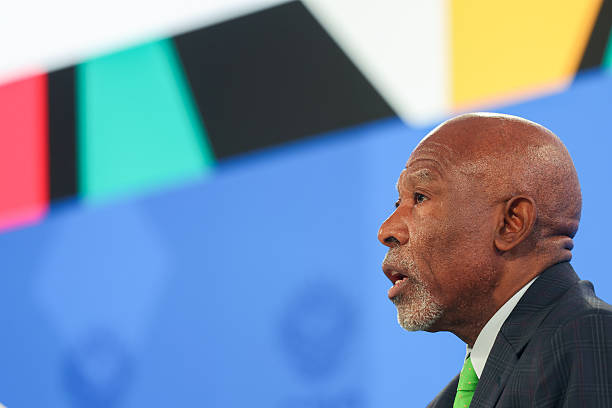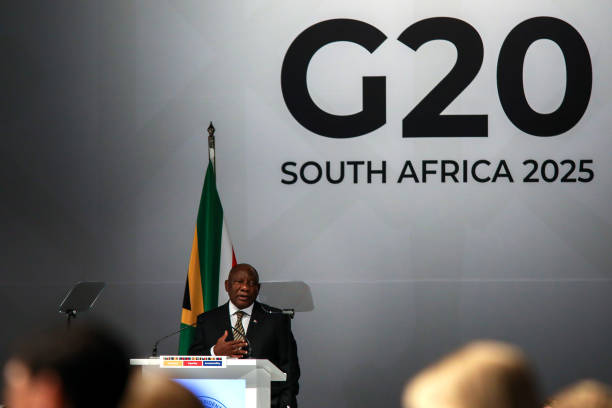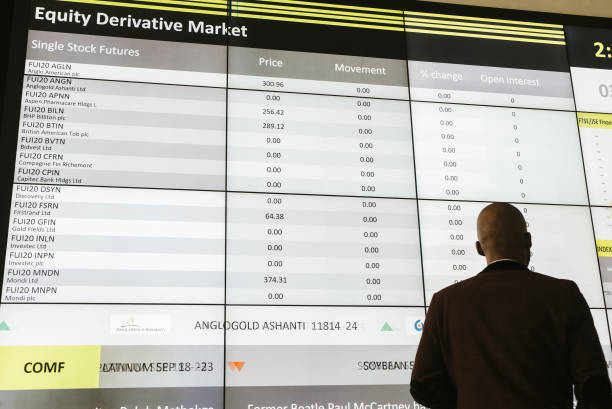South African Economy Holds Steady Despite US Tariffs

In the complex web of international trade, few events are as disruptive as tariffs imposed by a major economic power. For South Africa, the recent move by the United States to apply tariffs on selected exports—particularly steel, aluminum, and certain agricultural products—was expected to cause deep economic ripples. Yet, against the tide of global pessimism, South Africa’s economy has demonstrated an unexpected steadiness. The nation’s resilience is not without reason; it is born of a mixture of historical grit, strategic positioning, and a pragmatic understanding that survival often lies in adaptation rather than confrontation.

SOURCE: gettyimages
A Storm on the Horizon
When Washington announced the tariff increases earlier this year, trade analysts warned of an inevitable slowdown. For a country that counts the US among its top export destinations, the threat was real. South Africa’s trade balance relies heavily on mining products, metals, and high-value agricultural goods such as citrus fruits and wine—some of which now face higher duties entering the US market.
In ordinary circumstances, this might have triggered immediate panic on the Johannesburg Stock Exchange, weakened the rand, and left business confidence plummeting. Yet, the initial impact was surprisingly muted. Yes, there was the expected knee-jerk market reaction, and yes, exporters voiced frustration, but there was also an air of cautious defiance. It was almost as if South Africa had been here before—and indeed, in many ways, it has.
Lessons from the Past
Economic resilience is rarely built overnight. South Africa’s history has conditioned its economy to survive under pressure. During the apartheid years, the nation faced sanctions and trade restrictions from much of the Western world. Those years forced local industries to diversify their markets, innovate in production, and establish alternative trade routes. In the decades since, these survival skills have not been forgotten.
Today, South African exporters are once again drawing on that instinctive adaptability. Trade delegations have stepped up efforts to deepen relationships with Asian markets, particularly China and India, which already absorb significant volumes of South African minerals. The African Continental Free Trade Area (AfCFTA) also offers a growing intra-African market that could absorb some of the products redirected from the US.
The Rand’s Measured Response
Currency markets are often quick to amplify economic anxiety, but the rand has held firmer than expected in the weeks since the tariffs were announced. While there have been fluctuations, the rand’s measured response has been a signal that investors believe in the underlying strength of South Africa’s macroeconomic fundamentals—at least for now.
This confidence has been helped by the South African Reserve Bank’s cautious monetary policy, which has kept inflation in check despite rising import costs. More importantly, the central bank’s independence has reassured investors that any turbulence will be managed with economic stability, not political expediency, in mind.
Exporters Find New Pathways
While the tariffs undeniably cut into profit margins for some exporters, others have turned to creative solutions. Citrus farmers, facing higher duties in the US, have doubled their shipments to Europe, where demand remains strong. The wine industry, long adept at telling South Africa’s story through its products, has intensified marketing in emerging markets where middle-class consumers are developing a taste for imported wine.
Steel manufacturers, meanwhile, are courting clients in Southeast Asia and the Middle East, offering competitive prices and stressing the quality and reliability of South African products. These pivots are not instant fixes, but they represent the sort of long-game thinking that could pay off if US tariffs remain in place for years.
Government’s Balancing Act

SOURCE: gettyimages
The South African government has chosen a diplomatic rather than combative approach to the tariff issue. Trade Minister Ebrahim Patel has confirmed that talks with US trade representatives are ongoing, with South Africa pushing for sector-specific exemptions. At the same time, Pretoria is avoiding rhetoric that could escalate tensions—a strategy aimed at keeping doors open rather than burning bridges.
The government is also investing in infrastructure upgrades, particularly at ports and railways, to make exports more competitive by reducing logistical bottlenecks. These moves signal that South Africa understands the importance of staying nimble in a global trading environment where protectionism is making a comeback.
Beyond the Numbers—The Human Factor
For all the macroeconomic analysis, the true test of resilience lies with ordinary South Africans. The tariffs have real implications for jobs in export-heavy industries, from the dockworkers in Durban to the farmhands in Limpopo. While there is pride in the nation’s ability to weather economic storms, there is also a quiet anxiety about the long-term effects.
In places like the Vaal Triangle, where steel production supports entire communities, even small declines in exports can have ripple effects—from reduced overtime pay to delayed community projects. Similarly, citrus farming towns in the Eastern Cape are wary that if the US market remains difficult to access, farmers may cut back on seasonal hiring.
These human stories are a reminder that while national GDP figures may hold steady, the pain of global economic shifts is often unevenly distributed.
Holding Steady—But for How Long?
South Africa’s ability to keep its economic head above water despite the US tariffs is commendable, but it is not a permanent guarantee. Much will depend on the country’s capacity to diversify export markets, enhance local manufacturing, and deepen trade ties within Africa. The AfCFTA offers a tantalizing vision of a future where African nations trade more with each other than with far-off partners—but that vision will require consistent investment in infrastructure and trust-building among member states.

SOURCE: gettyimages
Equally important is the need for South Africa to continue attracting foreign investment. While the country’s political landscape can sometimes rattle investor confidence, its relatively sophisticated financial system, resource wealth, and strategic location keep it on the radar for global capital.
Around the Corner—What’s Next?
The road ahead will be defined by a mix of external factors and internal choices. If the global economy slows further, demand for South African exports could weaken regardless of tariffs. On the other hand, if Pretoria can secure tariff relief in negotiations with Washington—or successfully redirect exports to untapped markets—the sting of US protectionism may fade into a manageable challenge rather than a crisis.
South Africa’s story in the face of these tariffs is one of a nation refusing to be defined by circumstances beyond its control. It is a reminder that resilience is not about avoiding the storm but about learning to sail through it, using every shift in the wind to maintain forward momentum.
And perhaps that is the quiet advantage South Africa holds—an ability to face the unpredictable tides of global trade with a steady hand on the helm, guided by the lessons of its past and the possibilities of its future.
You may also like...
Super Eagles Fury! Coach Eric Chelle Slammed Over Shocking $130K Salary Demand!
)
Super Eagles head coach Eric Chelle's demands for a $130,000 monthly salary and extensive benefits have ignited a major ...
Premier League Immortal! James Milner Shatters Appearance Record, Klopp Hails Legend!

Football icon James Milner has surpassed Gareth Barry's Premier League appearance record, making his 654th outing at age...
Starfleet Shockwave: Fans Missed Key Detail in 'Deep Space Nine' Icon's 'Starfleet Academy' Return!

Starfleet Academy's latest episode features the long-awaited return of Jake Sisko, honoring his legendary father, Captai...
Rhaenyra's Destiny: 'House of the Dragon' Hints at Shocking Game of Thrones Finale Twist!

The 'House of the Dragon' Season 3 teaser hints at a dark path for Rhaenyra, suggesting she may descend into madness. He...
Amidah Lateef Unveils Shocking Truth About Nigerian University Hostel Crisis!

Many university students are forced to live off-campus due to limited hostel spaces, facing daily commutes, financial bu...
African Development Soars: Eswatini Hails Ethiopia's Ambitious Mega Projects

The Kingdom of Eswatini has lauded Ethiopia's significant strides in large-scale development projects, particularly high...
West African Tensions Mount: Ghana Drags Togo to Arbitration Over Maritime Borders

Ghana has initiated international arbitration under UNCLOS to settle its long-standing maritime boundary dispute with To...
Indian AI Arena Ignites: Sarvam Unleashes Indus AI Chat App in Fierce Market Battle

Sarvam, an Indian AI startup, has launched its Indus chat app, powered by its 105-billion-parameter large language model...




